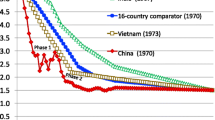Abstract.
The people whose interests are most adversely affected by frequent bearing and rearing of children are young women. Social changes that expand the decisional power of young women (such as expansion of female literacy, or enhancement of female employment opportunity) can, thus, be major forces in the direction of reducing fertility rates. This “cooperative” route seems to act more securely – and often much faster – than the use of “coercion” in reducing family size and birth rates. This essay examines the comparative evidence from India and China on this subject as well as the interregional contrasts within India. JEL classification: J11, J13, O15
Similar content being viewed by others
Author information
Authors and Affiliations
Additional information
Received August 20, 1996/Accepted November 14, 1996
Rights and permissions
About this article
Cite this article
Sen, A. Population policy: Authoritarianism versus cooperation. J Popul Econ 10, 3–22 (1997). https://doi.org/10.1007/s001480050029
Issue Date:
DOI: https://doi.org/10.1007/s001480050029




